Anuradha Koirala
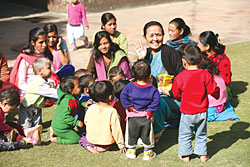 |
In recognition for her tireless work to combat human trafficking, Anuradha Koirala, founder and chairperson of Maiti Nepal, was declared the CNN Hero of the Year 2010. Koirala was voted Hero of the Year with the overwhelming support she received home and abroad, edging out over 10,000 nominations from 100 countries.
Anuradha Koirala started Maiti Nepal with two rooms in 1993. Seventeen years on, Maiti Nepal has outreach in 29 districts, and a global network of supporters. The institution is at the forefront in rescuing and rehabilitating victims of trafficking and has rescued over 12,000 girls so far. Koirala was awarded a total sum of US$125,000, which she plans to use for Maiti Nepal's work.
The Nepali women's football team
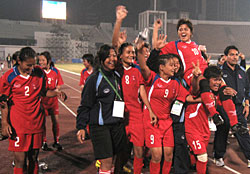 |
Nepali women footballers have returned with two runner-up trophies this year, one from the 11th South Asian Games, and the other from the SAFF Women's Football Championship.
Despite limited training, resources and less attention compared to the men's team, the women's team has performed exceedingly well internationally. In the South Asian Games, they defeated Sri Lanka 8-0, and in SAFF they thrashed Afghanistan 13-0 and Pakistan 11-0. Striker Anu Lama was the star of SAFF, scoring three hat-tricks to be declared the best player of the tournament. We can look forward to more improvement � the team was defeated 0-5 by India in the SAG final, but it was a much more closely fought match when they lost 0-1 to the same team in the SAFF final recently.
Shrikrishna Upadhyay
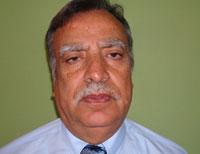 |
Shrikrishna Upadhyay and the organisation he founded, SAPPROS (Support Activities for Poor Producers of Nepal), are co-winners of the 2010 Right Livelihood Award that honours and supports those doing practical and exemplary work in the fields of ecology, development and social justice.
Upadhyay shared the 200,000 pounds award this year with activist Nnimmo Bassey (Nigeria), Bishop Erwin Kr�utler (Brazil), and Physicians for Human Rights (Israel). Often referred to as the 'Alternative Nobel', the Right Livelihood Award has in the past honoured people like Canadian environmental activist and broadcaster, David Suzuki, the Kenyan campaigner Wangari Mathai, Indian environmentalist Vandana Shiva, and American ecological economist Herman Daly. Upadhyay received the award in the Swedish parliament on 6 December.
SAPPROS Nepal, set up almost two decades ago, is working in 16 districts in the areas of community development, saving and credit, micro-irrigation, and health and sanitation through user and self-help groups.
Min Bahadur Gurung
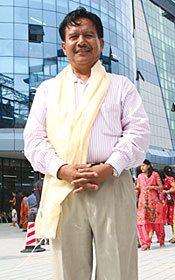 |
Owner of two biggest supermarkets in the country and a rapidly growing business, what makes this self-made entrepreneur stand out is his commitment to give back. Bhatbhateni Super Market began as a small grocery shop but now employs over 600 people. As part of its corporate social responsibility, Bhatbhateni Super Market has been providing scholarships to students from remote districts and supports several hospitals and schools. Recently Gurung announced funds for the construction of an Emergency Centre at TU Teaching Hospital and scholarships for two students from Rolpa and Khotang to study MBBS at the Patan Academy of Health Sciences.
Gurung's target is to open 100 stores across the country in ten years, one in every district, and create 50,000 new jobs. He also wants to create a market for agricultural produce by lending money to villagers to set up agricultural cooperatives and providing seeds and fertiliser from his shops.
Prabal Gurung
 |
Nepali fashion designer is creating waves in the international fashion scene with his bold and artistic designs. From winning a prestigious international fashion award to dressing America's First Lady, Prabal Gurung's achievements are an inspiration for every Nepali wanting to make it big. Prabal's designs have garnered critical and commercial success and his brand Prabal Gurung now sells in high-end stores in the US.
Gurung started out as a designer after graduating from New Delhi's National Institute of Fashion Technology. After a brief stint in the Indian fashion industry, he left for New York to pursue bigger dreams. There he ended up working for Bill Blass before branching out with his brand.
Mingmar Gyaljen Sherpa
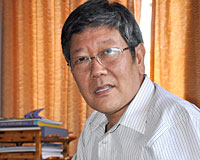 |
While most doctors shy away from working in remote districts, Mingmar Gyaljen Sherpa stayed as the chief of Solu District Hospital for 24 years. During this time, the availability of health services in Solukhumbu has improved dramatically. State-of-the-art sonogram equipment is now available and an impressive force of local health workers has been set up in the district.
Solukhumbu Technical School in Phaplu, which was set up under Sherpa's initiative, has produced 120 nurses, all of whom are working in their villages. Sherpa says the objective was to have human resources available at local level so villagers would not be deprived of health services. Sherpa himself was determined to stay and serve his community. "The government hardly cares about hospitals in remote areas so we had to find ways on our own," says Sherpa. Thanks to him, the women of Solu can now avail themselves of ultrasound services in their homes for free: nurses visit their homes for health check-ups. Maternal and infant mortality rates have plummeted in the district.
READ ALSO:
Covers of the year
2010, Blow by Blow
Culture
Books
Film & Theatre


